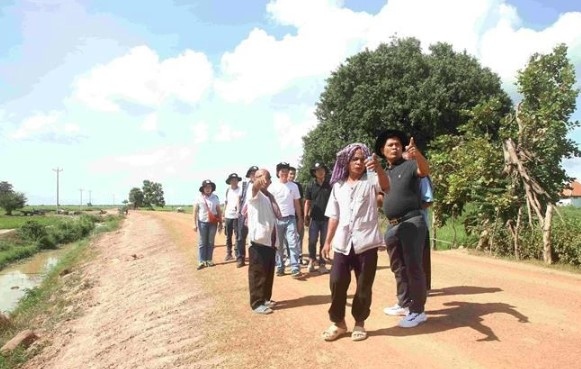Vietnamese scholars join trip to explore history about Pol Pot genocidal regime
Vietnamese experts have joined their Cambodian peers and Cambodian youngsters a trip held by the Documentation Centre of Cambodia (DC-Cam) to historical sites related to the Pol Pot genocidal regime in the neighbouring country to collect data and stories of this period.

Participating in the train trip from Phnom Penh to Pursat from August 20-23, Associate Prof. Dr. Pham Van Thuy, deputy head of the History Department of the University of Social Sciences and Humanities under the Vietnam National University-Hanoi, said that he is moved to see with his own eyes historical sites related to the Pol Pot genocide and the fight between Vietnamese volunteer soldiers and the Pol Pot regime, as well as to directly interview and listen to stories from historical witnesses.
Thuy said that researching the genocidal regime and exploring sad stories in history not only aim to cultivate and enhance knowledge and awareness but also seek initiatives and solutions in history education so that today and future generations will never repeat such painful history.
Following the trip, the University of Social Sciences and Humanities and DC-Cam will sign an agreement to strengthen their cooperation, he said.
During the journey themed “forced migration phases 2 and 3 under Pol Pot genocidal regime,” members interview witnesses and survivors of the genocidal regime nearly half a century ago.
Long Dany, director of DC-Cambodia's Veal Veng Reconciliation Centre, said that for more than three years under the brutal Pol Pot genocidal regime from late 1975 to 1978, the regime led by Pol Pot evacuated people in two stages from the Eastern region to the Northwestern region, currently in the provinces of Pursat, Battambang, Banteay Meanchey and Pailin of Cambodia.
Some 400,000–500,000 people were brought by the regime to the northwest region, while some 50,000 were from the east, including Prey Veng and Svay Rieng provinces, according to DC-Cam data. An official working at the station at the time witnessed thousands of people being evacuated along the railway line from Phnom Penh to other stations in Pursat and Battambang in northwest Cambodia.
According to Long Dany, along with grasping a deeper insight into the experiences of the forced displacement of survivors of the Pol Pot regime, the historical research trip by train also opened up opportunities for experience exchange between Vietnamese researchers and Cambodian teachers and youngsters, thus promoting mutual understanding, especially in historical matters.
Participating in the trip, the 18th of its kind, Minh Menghor, a second-year student from Phnom Penh, said that the tour provided him with new experiences and knowledge of his country's history.
Since March 2024, DC-Cam has organised 18 research tours by train, drawing more than 1,000 young people. However, this is the first time that foreign researchers have been invited to participate in the programme.
Dr. Chhang Youk, DC-Cam Director said that with Hanoi as the first place, DC-Cam hopes to attract more scholars and educators to its tours go explore the history and the Pol Pot genocidal regime, ensuring that stories of the victims and survivors will never be forgotten.

